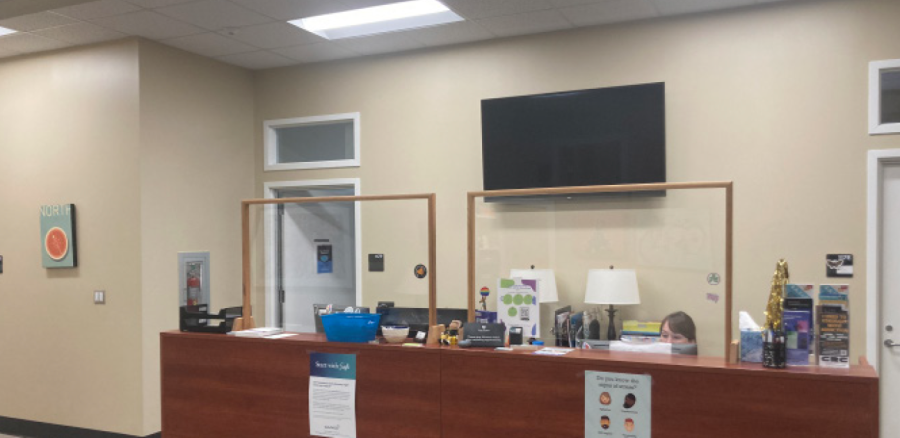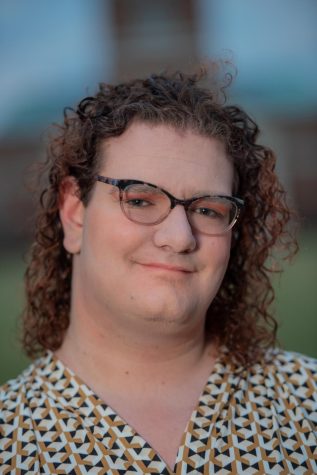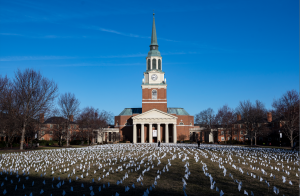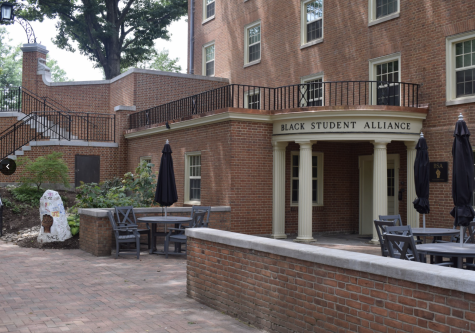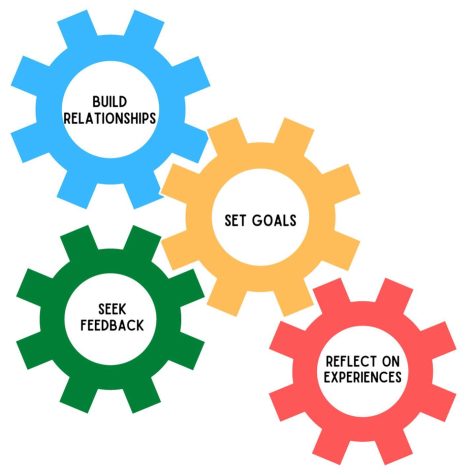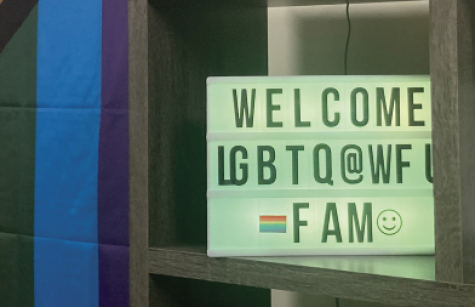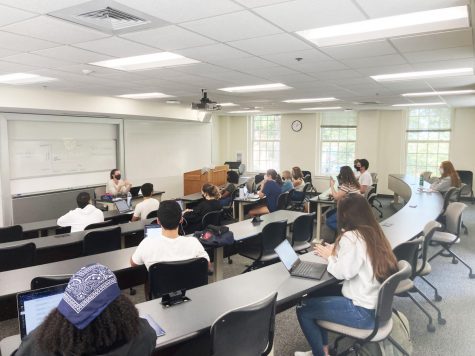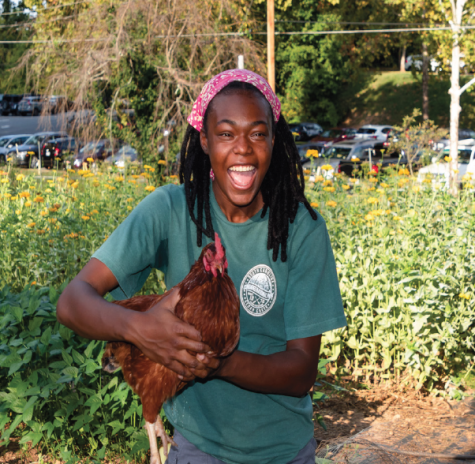Mental Health at Wake Forest
Drs. Warrenetta Mann and Denisha Champion of the University Counseling Center discuss mental well-being at Mother So Dear
With a dedicated staff and many options available, students are encouraged to seek mental health support from the University Counseling Center, which is open Monday-Friday from 8:30 a.m. to 5:00 p.m.
August 18, 2022
4Mental health is a vital aspect of the college experience. College can be incredibly fun, but it can also be a rocky time for many students’ mental well-being. I spoke with University Counseling Center (UCC) Director Dr. Warrenetta Mann and Associate Director for Community Engagement Dr. Denisha Champion to ask them about what they think incoming students should know and do to stay afloat in college. Our conversation, which has been edited for brevity, clarity and AP Style, is below.
Aine Pierre, Online Managing Editor: There are a lot of stressors and factors of mental health in college that I think a lot of people know to consider when moving in, but what are some of the non-obvious and unexpected things that you see students contend with?
Dr. Warrenetta Mann, Director of the UCC: I think a big hurdle is starting over with making friends. A lot of our students grew up in communities where they all went to the same elementary school, that fed into their middle school, that fed into their high school. And because they were pretty popular, it always felt like they had good friends. In college, they have to start that process all over again. It’s been a really long time since people have had to make new friends, and I think students are surprised by how anxiety-inducing it can be to meet new people and begin new relationships and put yourself out there with new people who you don’t know and who don’t know you.
We all develop a persona when we’re growing up, who we think we are or how we identify. At college, people don’t know you, they don’t know what you’re good at, they don’t know what you’re known for, you really have to kind of start over. I think students are surprised by how they respond to having to start that process over.
Dr. Denisha Champion, Associate Director for Community Engagement at the UCC: Something that I’ve noticed in our students is that because Wake Forest pulls in students who are at the top of their class, those students haven’t yet thought about the fact that the math doesn’t work out for everybody to be in that top 5% of the class. Just like Dr. Mann was describing this persona, or way of being that people grew up to be, for many of our students, that has translated into “I’m the smart one,” “I am the intellectual,” “I’m an academic.” And when those students run into that first really hard class, it sometimes rattlessometimes of rattles their identity, and they’re not expecting to have to contend with an identity crisis in their first year.
AP: Do you have any advice for students who are having to struggle with their identity?
DC: My advice to students is pretty consistently to be kind to themselves. I think our students can really self-flagellate when things are not going well or they’re not hitting some mark or doing something that they think they should be doing. The concept of self-compassion they all understand intellectually, but the actual practice of it is very difficult for many of the students that I’ve encountered. It’s simple, but it’s not easy.
WM: Be patient with the process. Starting college is a new beginning; it is something you’ve never done before. Things that you’ve never done before are going to be anxiety-inducing, and they’re going to require you to learn new things and skills that you’ve never used before. That feeling like you are not perfect at it is part of the process. I’m sure if upperclassmen could reflect back on what it felt like when they first got here, they would tell freshmen the same thing: relax. Yeah, you feel like you don’t know how to do this or like it’s not going to work out or you have all these worst-case scenarios in your head about how uncomfortable this is, but everything new starts out like that and gets better with practice. You just have to keep going.
AP: Can you speak a little bit about the balance between relying on your friends in a tough time and seeking professional help? I think a lot of students struggle with finding that line.
WM: I think one key to knowing when to utilize your friends and when to seek professional help is to think about what you want back from that person. If what you want is for somebody to listen and care about you, friends are great for that. If you feel like what you need back is somebody who has some feedback or expertise that can help you get unstuck from a place or make a particular choice, your friends, who may be struggling with similar choices, may not have the answer. So I think if you if what you’re looking for is something more substantive than just a listening ear, then it’s probably helpful to pull in a professional — even if it’s something that doesn’t feel pretty complex, like choosing a major.
Therapists don’t offer you the answers, so we’re not going to tell you what to do, but we have processes that can help you figure out those things. Some of those questions are ones that your friends haven’t figured out the answers to either, and so what’s helpful about having a professional is that we’ve been trained to help you work through a problem. We also have tools to give you that can help guide you to who you want to be. Your friends can be really good listeners — I think our students are great listeners and can say very warm and supportive and comforting things — but you are likely to leave with the same dilemma with which you came. And that’s okay, there are times when it’s your issue and you need to deal with it. But I think if you really feel like you’re stuck and you need help to get to a new place, professionals help.
Also, anything that interferes with your functioning — like anything that’s interfering with sleeping, eating, paying attention in class or your ability to function and do the things that you need to do — is something for which you need to seek professional help. We’re going to focus on helping you get back to a level of functioning that is going to work long-term.
AP: High school culture can be especially non-receptive to mental and physical health needs, especially when you’re trying to get into a top-30 school like Wake Forest. Do you have any advice for students who are navigating a world where professors and administrators care about their needs instead of saying, “suck it up, you need to be in class.” Do you have any advice about taking the steps toward getting help and seeking accommodations?
In high school, students were trying to get to a place like Wake Forest. Okay, now you’re here. This is really about building a life.
— Dr. Warrenetta Mann, UCC Director
WM: Both Dr. Champion and I think of college as moving from the sprint that is high school to the marathon. Life is a marathon, and college is where you start to build that. When you’re running a sprint, you start out of the gate fast and you just run as fast as you can until you get to the end. Often, when you get to the end, you are winded and you have a cramp, but you’re through it. When you’re running a marathon, however, there are stations along the way where you get water. There are places where you pace faster and places where you pace slower so that you can make the long haul. We want to teach students the skills to manage all the things that you have to do both in the classroom and outside — and that’s why there are co-curricular activities that we want you to be involved in, not just the academics. The goal is to learn how to make it through the marathon and build a life full of not only wonderful excellence and achievement, but also friends and fun and self-care for your body and mind. That’s the analogy that I think works best for people to think about what the differences are. In high school, students were trying to get to a place like Wake Forest. Okay, now you’re here. This is really about building a life.
DC: To me, a lot of what you just asked in that question has to do with the culture of an institution. If your high school culture was one of “yeah, I don’t care if you have the flu. I don’t care if you have COVID-19, you need to be here, you need to be doing the things,” it’s very hard to push back against that and to say that’s not the kind of life you want to live. All that to say, I think students have a great deal of power in their collective voice on this campus. And so if that “I don’t care, you need to be here” culture is something that exists at Wake Forest, whether it’s because people bring it from high school or if it’s something that’s just baked into Wake Forest, my advice is that students need to rise up against that. We’re not going to change the culture unless a majority of us agree that we’re not going to bow down at the altar of busyness or have interactions where stress levels are a measurement of success. I think students just need to rise up against that and say: “I’m trying to build a sustainable life. That is a marathon that I can actually run without just just passing out because I don’t have anything to sustain me.”
AP: On the subject of culture, a lot of students come to Wake Forest from areas in which there were a lot of people who looked like them, who believed the same things they did, who were of similar gender identity or sexual orientation, who realize that the same may not be true at college. I’m wondering if you have any insight into how students have found community, even if there’s fewer people who share their identities?
WM: College campuses are a microcosm of our world, and we all come to this place together and don’t really know each other very well. Finding places of comfort and safety often start small and grow from there. Campus Life is very intentional about how we are put together and organized, and our cultural and affinity spaces are where someone might start with that. And I think what you learn from attaching to those spaces and engaging with people in those spaces is that you’re not the only one. There are probably more people out there than you know or can visibly see on campus who identify similarly to you, who think like you or who want to connect with you regardless of identity, and you may not know who they are yet. I think you start from small pockets of safety, and then you grow your network from there, and that’s why we have both our identity and cultural centers as well as our as our ally programs, because while a student might not necessarily identify exactly like you, they might be a student that says, “well, someone in my family identifies like you and that’s like the closest person to me and I want to know you, and I want to be able to support you in the same way that I support that person.” And so there are a lot of connections that students can make with one another as they gradually begin to put themselves out there.
DC: To Dr. Mann’s point earlier about students not realizing the difficulty of having to start over and make friends, I think the complexity of that process is compounded when you are a person of a minoritized identity, if you’ve got something that you are not quite sure how people are going to respond to. Something that has stuck with me for over a decade was an experience I had leading a group in the Counseling Center for students across the LGBTQIA spectrum. One person said, “I wish that I could walk around campus and see a rainbow above the head of people like me that only me and people like me could see.” And that was coming from a place of really wanting to find community. Finding community here can be difficult because it’s a smaller community and a closed community. There are a lot of things that make it difficult, and I can’t tell you the number of students that I’ve just had to encourage to keep trying. It does take some people longer than others to find their people here.
AP: Is there anything else you want students to know about mental health at Wake Forest?
WM: I would just say that everybody has mental health, just in the same way that everybody has physical health. So whether you attend to it or not, it is going to be at a particular level, and it can rise up or dip down. I would say to just pay attention to it, don’t walk around as though you don’t have mental health. We all have it. We all need to attend to it.
And I would say that it’s important for upperclassmen to let people know that mental health is something that students actually care about. Freshmen take their cues about culture from upperclassmen; just like Dr. Champion said, you all build the culture of Wake Forest. And so if they are going to know that mental health matters on campus, that’s something that upper-class students have to be willing to talk about and say “actually, it does matter to us, we care about one another. We actually want to see people do well not just in class, but in life, and that we don’t want to see our peers in distress and we would rather you get the support and help that you need than to hear that you’re not doing well.”
Contact Aine Pierre at [email protected]


